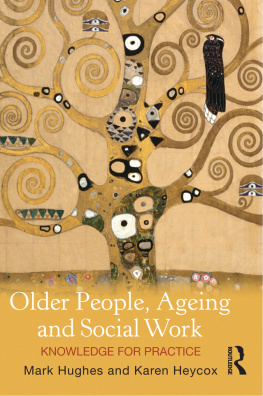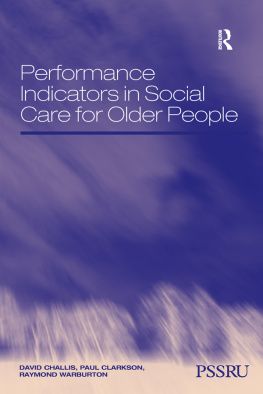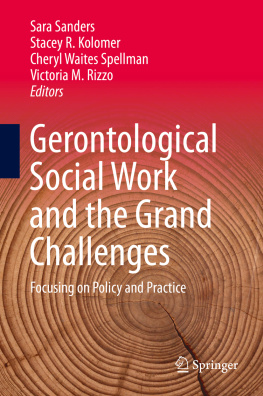Older People, Ageing and Social Work
Older People, Ageing and Social Work
KNOWLEDGE FOR PRACTICE
Mark Hughes and Karen Heycox
First published 2010 by Allen & Unwin
Published 2020 by Routledge
2 Park Square, Milton Park, Abingdon, Oxon OX14 4RN
605 Third Avenue, New York, NY 10017
Routledge is an imprint of the Taylor & Francis Group, an informa business
Copyright Mark Hughes and Karen Heycox 2010
All rights reserved. No part of this book may be reprinted or reproduced or utilised in any form or by any electronic, mechanical, or other means, now known or hereafter invented, including photocopying and recording, or in any information storage or retrieval system, without permission in writing from the publishers.
Notice:
Product or corporate names may be trademarks or registered trademarks, and are used only for identification and explanation without intent to infringe.
Cataloguing-in-Publication details are available
from the National Library of Australia
www.librariesaustralia.nla.gov.au
Index by Trevor Matthews
Set in 10.5/13.5 pt Georgia by Midland Typesetters, Australia
ISBN-13: 9781742370606 (pbk)
There are a number of realities that govern the development of social work with older people on an international basis; however, two distinctive and complementary trends can particularly be observed. First, there is now a clear acknowledgement that in all developed countries there will be increasing numbers of older people in the population; because this is generally true, it is not surprising that Mark Hughes and Karen Heycox base their analysis on the reality of this proposition for Australia. From this starting point it is confidently asserted that the mere fact that there is a greater number of older people in the population will also mean that there will be an increased demand upon health and social care services. In many countries this has led to almost apocalyptic predictions that the combination of more people living longer with long-term reductions in the birth rate constitute a 'demographic time bomb' that will cripple services and do inestimable damage to the fabric of society as a result. The fact that the world is mired in a deep recession at the time of writing exacerbates this pattern of thinking: it is a pressing global and national challenge to construct policies that will enable societies to respond to the difficulties that are predicted. Therefore, what should be a cause for celebrationmore people living longer, in better healthbecomes the harbinger of a political crisis.
The second point concerns the level of attention that is given to social work with older people. Given the increased levels of need that will derive from changes in the balance of the population, it could be argued that more skilled social work practice will be required to enable older people to engage successfully with the difficulties with which they maybe confronted. However, this apparently logical step is confounded by a belief thatfor some inexplicable reasonsolder people do not require the same levels of social work support as other groups. At the same time, there is international evidence that social work with older people is one of the least popular areas for practice, leading to the reality that many potentially excellent social workers prefer to establish their skills in work with other service user groups. While it has been suggested that the perceived low status of such workwhich is also reflected in the low priority given to similar specialisations in other professions such as medicineaffects the career choices of practitioners, there has also been an unfortunate belief that social work with older people is characterised by practice that contains little opportunity to demonstrate creative approaches and is therefore professionally unfulfilling. Consequently, there is arguably less good-quality literature that focuses on social work with older people than any other service user group.
It would appear that this general proposition holds true on a country-specific basis as well as internationally. For example, this excellent and stimulating book represents the first such undertaking with a specifically Australian location and focus. As such it is both timely and significant: indeed, there are numerous parts of the book that deal effectively with issues that are particular to the Australian context-focusing, for example, on social policy and practice with Indigenous people. However, it has also been organised and written with great clarity and skill. As such, it is also of considerable international relevance. Chapters that focus, for example, on general perspectives on ageing, dementia, caring and the end of life are consistent themes that preoccupy social workers across nations. In addition, it also addresses issuessuch as working with lesbian, gay, bisexual and transgender older peoplethat are often downplayed in the standard literature. This combines to ensure that the book should become essential reading for practitioners, educators and researchers within the general field of social work with older people, and a useful resource for members of other professional disciplines.
This conclusion is not only based on the content and relevance of the material addressed, however, but also on the way in which it has been constructed, the appropriateness of the examples chosen, and the overall quality of writing that characterises the book. In particular, Hughes and Heycox stress the interaction between policy and social work practice: they propose that, far from passively carrying out social policies, social workers are well placed to influence them. As a result, they argue that it is vital for there to be 'an ongoing critical and reflective engagement with the complexities involved in older people's lives and in social work practice with older people'. This is a conclusion that I wholeheartedly endorse; indeed, I would argue that this book makes a considerable contribution to just such a debate, for which the authors deserve our thanks.
Dr Mark Lymbery
Associate Professor of Social Work
University of Nottingham
United Kingdom
This book arises from our experience working together at the University of New South Wales, including our experience researching issues related to social work practice with older people. Both of us have lengthy practice backgrounds in working with older people, and have greatly appreciated the importance and rewards of this area of practice. We have a shared commitment to acknowledging the diversity of older people, and their strengths and resilience.
Over the years, we have been concerned that professionals, managers and academics do not always appreciate the complexity and potential of social work practice with older people. It is sometimes seen as low status, and is not always well supported or appropriately resourced by health and human service agencies. Ageist attitudes and practices, apparent among professionals just as they are throughout the rest of the community, remain barriers to effective practice in this area.
In this book, we aim to make accessible to social workers core knowledge, with accompanying practice implications, for work with older people and ageing. And we hope the book will enable social workers and their employing organisations to consider more fully the potential of social work practice with older people.








